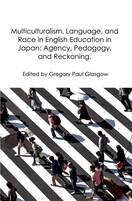Introduction to the Volume by Gregory Paul Glasgow
Excerpt
"The image of the English Language Teaching (ELT) profession is often presented as one that “by nature attracts professionals who are willing to work with people across racial boundaries, and [is thus] considered a ‘nice’ field” (Kubota, 2002, p. 86), which reflects liberal and pluralistic values. However, it is a field not without its own challenges at this current moment in our history, which many view as a global and cultural reckoning on matters related to race, racism, and identity (Coke & Naylor, 2020). In ELT, problematic discourses linger regarding the notion of the “ownership of English” and the “idealized speaker of English” due to the dichotomy between so-called ‘non-native’1 English-speaking teachers (NNESTs) and ‘native’ English-speaking teachers (NESTs)—a dichotomy that unfortunately intersects with views of ethnoracial and cultural difference. These discourses are translated into pedagogical practices, educational cultures, and social structures in educational institutions, thereby enhancing or constraining teacher and learner identities (Zotzmann & Rivers, 2017). More than ever, in our field, we need to promote intercultural awareness, raise attention to discriminatory practices, and raise appreciation for diversity in order to dismantle inequities. Therefore, we—the editor and contributors—intend to initiate and build upon important conversations on race, language, and multiculturalism and how they currently inform pedagogical practice in English Language Teaching (ELT) in Japan. We sincerely hope that the experiences and pedagogical actions documented in this volume will motivate others to take similar action" (p. 7).
Note
*The terms ‘native speaker’ and ‘non-native speaker’ are often put in inverted commas to highlight their contested nature, according to Holliday (2006).
About the Contributor
Gregory Paul Glasgow holds a Ph.D. in Applied Linguistics from the University of Queensland, Australia, and he is currently an Associate Professor at Kanda University of International Studies in Chiba Prefecture. He co-edited the volumes Agency in Language Policy and Planning: Critical Inquiries and Researching Agency in Language Policy and Planning (with Jeremie Bouchard), published by Routledge. His research draws on critical applied linguistics and social theory to examine issues in language-in-education policy, language management, and the politics of Global Englishes in TESOL. Dr. Glasgow is also interested in second language teacher education (SLTE), and ELT practices that promote multiculturalism, equity, intercultural awareness, and social justice.
Citation
Glasgow, G. P. (2023). Introduction to the volume. In G. P. Glasgow (Ed.), Multiculturalism, language, and race in English education in Japan: Agency, pedagogy, and reckoning (pp. 7–22). Candlin & Mynard. https://doi.org/10.47908/26/i
"The image of the English Language Teaching (ELT) profession is often presented as one that “by nature attracts professionals who are willing to work with people across racial boundaries, and [is thus] considered a ‘nice’ field” (Kubota, 2002, p. 86), which reflects liberal and pluralistic values. However, it is a field not without its own challenges at this current moment in our history, which many view as a global and cultural reckoning on matters related to race, racism, and identity (Coke & Naylor, 2020). In ELT, problematic discourses linger regarding the notion of the “ownership of English” and the “idealized speaker of English” due to the dichotomy between so-called ‘non-native’1 English-speaking teachers (NNESTs) and ‘native’ English-speaking teachers (NESTs)—a dichotomy that unfortunately intersects with views of ethnoracial and cultural difference. These discourses are translated into pedagogical practices, educational cultures, and social structures in educational institutions, thereby enhancing or constraining teacher and learner identities (Zotzmann & Rivers, 2017). More than ever, in our field, we need to promote intercultural awareness, raise attention to discriminatory practices, and raise appreciation for diversity in order to dismantle inequities. Therefore, we—the editor and contributors—intend to initiate and build upon important conversations on race, language, and multiculturalism and how they currently inform pedagogical practice in English Language Teaching (ELT) in Japan. We sincerely hope that the experiences and pedagogical actions documented in this volume will motivate others to take similar action" (p. 7).
Note
*The terms ‘native speaker’ and ‘non-native speaker’ are often put in inverted commas to highlight their contested nature, according to Holliday (2006).
About the Contributor
Gregory Paul Glasgow holds a Ph.D. in Applied Linguistics from the University of Queensland, Australia, and he is currently an Associate Professor at Kanda University of International Studies in Chiba Prefecture. He co-edited the volumes Agency in Language Policy and Planning: Critical Inquiries and Researching Agency in Language Policy and Planning (with Jeremie Bouchard), published by Routledge. His research draws on critical applied linguistics and social theory to examine issues in language-in-education policy, language management, and the politics of Global Englishes in TESOL. Dr. Glasgow is also interested in second language teacher education (SLTE), and ELT practices that promote multiculturalism, equity, intercultural awareness, and social justice.
Citation
Glasgow, G. P. (2023). Introduction to the volume. In G. P. Glasgow (Ed.), Multiculturalism, language, and race in English education in Japan: Agency, pedagogy, and reckoning (pp. 7–22). Candlin & Mynard. https://doi.org/10.47908/26/i

Information About the Book
Title: Multiculturalism, Language, and Race in English Education in Japan: Agency, Pedagogy, and Reckoning
Editor: Gregory Paul Glasgow
Publication date: March 2023
Read more...
Title: Multiculturalism, Language, and Race in English Education in Japan: Agency, Pedagogy, and Reckoning
Editor: Gregory Paul Glasgow
Publication date: March 2023
Read more...
